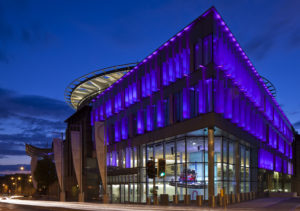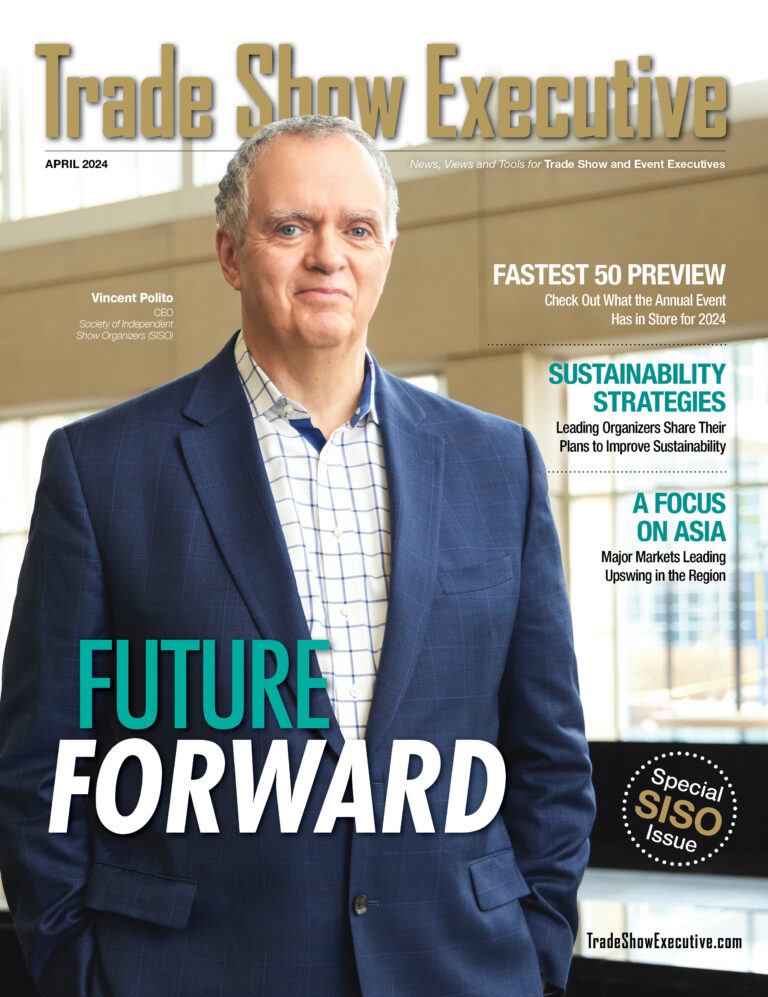 While the EU stands for unity within its 27 member countries, in the case of COVID-19, each individual country within the Union is very much on its own with respect to when it will welcome back trade shows and other large events. Countries in Europe and around the world are in uncharted territory and the decision to host an event of any size is now fraught with competing economic and health interests.
While the EU stands for unity within its 27 member countries, in the case of COVID-19, each individual country within the Union is very much on its own with respect to when it will welcome back trade shows and other large events. Countries in Europe and around the world are in uncharted territory and the decision to host an event of any size is now fraught with competing economic and health interests.
Although the landscape is ever-changing, with many moving parts and ever-shifting paradigm protocols set by each individual country, the collaboration has been unprecedented. The industry has come together with one common goal in mind — the safe reopening of events in Europe. The Global Association of the Exhibition Industry (UFI) developed Good Practice Guidance with AIPC and ICCA, and partnered with Informa to create standards guideline, AllSecure, to ensure the industry is ready to welcome trade shows once again.
Permission is one thing, and easier to give than that critical feeling of safety, which is absolutely essential before welcoming back business. Without it, people simply won’t attend. Barbara Weizsäecker, Secretary General, European Exhibition Industry Alliance, is frank when she says lifting the travel restrictions in a coordinated way, as soon as reasonably possible, is crucial, but will be too late for most of the large international B2B exhibitions in fall 2020. “Many of them were canceled in the last weeks, despite permission to open — simply because the clients are not convinced it’s safe and many are also in a bad situation with reduced marketing budgets. So far, not many shows in Q1 2021 have been cancelled, so there is still hope, provided we do not see a terrible second wave in the autumn.”
And therein lies the difficulty. While many countries experienced dramatic surges in COVID-19, others have stabilized and are ready to loosen the reins on gatherings. Take France for instance. As of October, it will allow gatherings of more than 5,000 attendees.
The United Kingdom got some much-needed good news when Prime Minister Boris Johnson confirmed that trade shows will be permitted beginning October 1, 2020, depending on local data and the discretion of local authorities.
“The impact of COVID-19 has been devastating, so we are delighted with the announcement that we now have a timeframe to work to and recommence. It’s positive proof that the government has been listening to the sector and understands that we can open safely,” Jane Longhurst, Chief Executive, The Meetings Industry Association, said. The MIA had written an open letter to the UK government warning of the catastrophic consequences of not reopening meetings and conventions.
“We have demonstrated through our roadmap to reopening, which you have signposted in your Visitor Economy Guidance, that we can open and operate safely. Safety always has and always will be at the forefront of everything we do. Across the UK, wherever organized and planned events take place, robust health and safety standards and risk assessments are always in place — it’s what we do every working day,” Longhurst wrote.
Convention centers are working hard to ensure business will safely resume through the We’re Good to Go industry standard. It is the official U.K. mark to signal that a convention center has worked hard to follow government and industry COVID-19 guidelines and has a process in place to maintain cleanliness and social distancing.
The industry is actively joining forces to get trade shows going again. A new campaign, One Industry, One Voice, One Message, is much more than just its hashtag, #WeCreateExperiences. Some of the aims of the campaign are to reassure the public that the industry is a global expert in safety measures, and to emphasize the power of events to educate.
Trade Shows and Business Events are Not Mass Gatherings
One of the biggest issues of contention is the fact that the WHO (World Health Organization) categorized conferences, events and trade shows as mass gatherings, along with concerts and large sporting events, thereby ensuring they would be relegated to the last phase of reopening, that which requires a vaccine. “We need to lobby to get out of that,” Douglas Emslie, Group Managing Director, Tarsus Group, and current SISO Chair, said in a recent webinar on the topic.
The Go Live Together coalition is determined to help. “We’re not a mass gathering; we’re not congregating for social or recreational purposes, and we have a lot of the benefits of outdoor space in terms of mitigating the risk of spreading COVID-19,” said Sue Sung, Freeman Senior Vice President of Corporate Strategy and director of the Go Live Together coalition. “With convention centers having an average ceiling height of 30-40’, this helps mitigate many of the concerns associated with close indoor gatherings. But we need to help legislators understand this; it’s critical to take this into consideration with reopening plans,” she added.
“Exhibitions are a source of business and socio-economic impact as well as a source of social ties. However, now that we are ready to host events while ensuring the health and safety of all, the persistent closure measures are threatening our entire industry,” said Maurits van der Sluis, EMECA President and COO of RAI Amsterdam. The EMECA venues represent 24 major European exhibitions centers, hosting over 1,800 trade shows annually and over 360,000 exhibitors.
While intra-EU travel is now permitted, openings with third countries are under negotiation, depending on the local pandemic situation and health and safety conditions. With Americans currently banned from entering Europe, one would assume that the international trade shows scheduled to begin in September would have a more Eurocentric focus. However, that’s not necessarily the case.
Weizsäecker admits that large international shows that typically have high U.S. attendance (and high attendance from other international exhibitors and visitors who still cannot travel to Europe) are struggling or have already canceled their events entirely, while others are offering digital formats in addition or as a substitution. But most, she concedes, are just canceled. “The smaller ones that are more European, or even national/regional, are less impacted,” she added.
Italy plans to present the Vicenzaoro International Community Event with a unique format at Vicenza Expo Centre, September 12-14. The presentations and seminars will be livestreamed and viewable on YouTube, Instagram, and Facebook.
Weizsäecker explains that industry leaders have successfully educated governments about the marked differences between trade shows, festivals and concerts, and further, that attendees will be safe and secure while attending events. “But due to long lead times, most countries won’t plan large exhibitions before September,” Weizsäecker said.
Related. Strong Advocacy Leads Way to European Countries Opening Exhibitions; Many without Restrictions
German Know How
While many neighboring countries struggle to find their footing, the German government acted swiftly and essentially to formally exclude exhibitions from the category of “mass gatherings,” giving 16 German states the greenlight to welcome back trade shows with health and safety protocols and strict adherence to a number of preconditions. While mass gatherings such as concerts remain banned until the end of August, the German trade show and events industry continues apace.
“We are advocating that not all types of events are equal, and it is encouraging to see that this message has reached the government of one of the world’s most important exhibition markets,” UFI President Mary Larkin said. “Every exhibition is an organized event; as an industry, we know how to create conditions where attendees can go about their business while taking the necessary precautions in the age of COVID-19.”
Related. UFI Framework
Despite the greenlight and Germany’s increased optimism, not all attendees and exhibitors are prepared to meet just yet. In a recent letter to Koelnmesse’s customers and partners, the management board announced that, despite extensive efforts to safely resume trade shows in the fall, their customers have expressed discomfort and concern for the health of their employees and exhibitors, and Koelnmesse will therefore not hold events of its own in Cologne through the end of October 2020. Gamescom and DMEXCO 2020 will instead be held in an all-digital format.
Dutch Engineering
Germany may have been first to get the go-ahead, but neighboring countries — including Spain, Switzerland, Italy and The Netherlands — having beaten down their own COVID-19 curves, are now poised to welcome back trade shows and other tourists.
As of July 1, RAI Amsterdam has been cleared to reopen and host major events without any restrictions on attendee numbers. The convention center has already ensured that its facility is COVID-19 ready and in full accordance with all health and safety guidelines.
“We are pleased with the relaxation of rules announced on July 1. By observing the rules and guidelines, we are ready to organize and facilitate events in a safe and responsible manner, while ensuring visitors receive a hospitable welcome. I am also delighted that we will again be opening our doors to the renowned international congress Money20/20 in September,” van der Sluis said.
In anticipation of government regulations allowing the reopening of the RAI, staff devoted exhaustive time and resources to adapt its facilities and protocols to ensure events would be held in a safe and responsible, yet welcoming, manner. Examples include wider aisles, floor markings indicating where queues may form, increasing the number of registration desks and ensuring hand sanitizer is readily available in all areas.
Written for everyone involved in the organization and management of these events, their document, RAI Amsterdam: Safe, Responsible and Hospitable Protocol, outlines the rules and guidelines for trade shows, exhibitions, conferences and meetings in the RAI facility.
Italian Design
“For the trade shows scheduled for fall 2020 and Q1 2021, we are ready to take off again — live,” said the Italian Exhibition Group. A committed working group — liaising closely with outfitting and catering companies, technicians and international operators — developed over 50 guidelines with a rigorous regulatory and organizational protocol that focuses on every phase of the trade show and conference experience.
These regulations include transportation to venues, accreditation and access procedures, organization of F&B areas and overall management of the entire venue to ensure the total safety of visitors and workers. “We are determined to recover as much as possible after the activity blackout that we suffered along with all the world’s expo hubs and clients due to the pandemic,” said the Italian Exhibition Group. “Not only are the needs of those attending physically being attended to, but a virtual component will be created for those from countries who may have difficulty traveling to Italy.”
Swiss Timing
The Swiss government allowed the maximum size of gatherings to be raised on June 22, from 300 to 1,000 people, so long as the number of people to be contact-traced in case of infection remains at no more than 300. Other provisions include:
- Contact tracing must be possible at all times.
- Event organizers must ensure that the maximum number of people to be contacted does not exceed 300, which can be achieved by dividing the venue into sectors.
- Switzerland Tourism released the Clean & Safe label that can be used by venues to reassure delegates of its hygiene and cleanliness levels.
- Each Swiss establishment, whether it’s a restaurant, hotel or event venue, are required to have a security concept approved by the government. Otherwise, they are not permitted to open.
Scottish Drive
While many countries are literally back in business, not all members of the EU are rolling out the red carpet just yet, Marshall Dallas, Chief Executive of the Edinburgh International Conference Centre (EICC), explained. He referred to the countries treating conferences differently than other mass gatherings that are banned under social distancing rules: “Other European countries, such as Spain and Germany, have clearly differentiated between business events and large gatherings,” Dallas said.
“My ask is that the Scottish government make a similar distinction so we can get the wheels turning sooner rather than later and get this massive contributor to the Scottish economy open and trading,” Dallas said. “We have highlighted to the Scottish Government that, unlike mass entertainment gatherings, business events, by their very nature, follow a controlled and structured format, making the adherence to social distancing and other related measures achievable,” he added.
Dallas points out that in purpose-built conference centers, like the EICC, there is the required space to spread out and adhere to stringent health and safety measures. “As you would expect, the easing of travel restrictions and the timetable put in place is going to be a big factor in determining how quickly we can resume more normalized activity at the EICC,” Dallas said.
Each country within the EU is working diligently to not only determine their best possible date for reopening, but to also assure attendees and exhibitors that they have met — or beat — the most stringent health and safety protocols. While the long-term economic impact of COVID-19 is only now beginning to reveal itself, customer safety and a sense of security will continue to compete with critical economic interests.
Sidebar
Tracking the Virus
European trade show organizers are using the help of several online tools to gauge the virus. To that end, Visit Flanders, the tourist office for Flanders, Belgium, in conjunction with Karel de Grote university college in Belgium and the Belgian Government, has created a COVID Event Risk Model (CERM) matrix for conference and meeting planners that want to organize events in Belgium. Planners can fill out a questionnaire focused on 20 parameters known to reduce the spread of the virus and will be able to gauge their trade show for potential risks. It can be accessed here.
Another website that offers statistics in real-time that highlights COVID-19 hotspots can be accessed here.
Reach Barbara Weizsäecker at (32) 2 535 72 50 or barbara.weizsaecker@exhibition-alliance.eu; Sue Sung at sue.sung@freeman.com; Silvia Giorgi at silvia.giorgi@iegexpo.it or (39) 541 74 48 14; Marshall Dallas at +44 (0) 131 300 3000 or marshalld@eicc.co.uk











